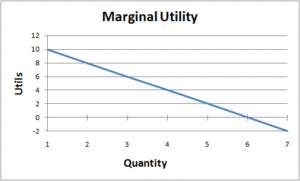
‘Utils’ is how an economist defines satisfaction. Quantity can be anything that you have or want (money, time, number of vacations you take etc.).
In the pursuit of financial independence (FI), you will have to deal with frugality. Frugality, like many things in life, is relative. I always find it curious to read how someone can live under $10,000 a year or under $15,000 a year with family (in a developed country. This qualifier is important because these figures are a comfortable middle class income in many developing countries). I read such articles more to understand the full extent of human ability to shrink their expense footprint beyond what many consider as feasible.
The skills displayed by some proponents of ‘extreme early retirement’ are so impressive that I often come away wondering if only these people had applied such skills in their corporate jobs, how much money would they be earning? Most companies would love to have such cost-conscious employees on their payroll coming up with ways to save money for the company. Instead, I guess they prefer extreme shrinking (of expenses) rather than meaningful expansion (of income).
To be clear, I also believe in frugal living, but my concept of frugality is based on the ‘middle road’ and not giving up daily conveniences that make life comfortable. Any full-time job you do, no matter how stressful, can be organized better to generate some valuable personal time. Once you ‘earn’ that personal time, spend it in the most rejuvenating manner possible. It’s the quality of that time, and not quantity, which ultimately determines how eagerly you look forward to the next working day. In many jobs, it often makes sense to work on your time management skills rather than ditching the job entirely.
On the other hand, if you buy into the narrative that your job is a ‘cubicle prison’, you have no choice but to develop an alternate narrative to justify spending the rest of your days coming up with creative ways to cut your living expenses to the extreme so that your available nest egg can support you. The alternative narrative could be that I find it more enjoyable to look for creative ways to save money so I can shrink my budget even further rather than earn money in a cubicle farm. At some point though, the idea of continually looking for ways to save money in every endeavor of your life gets tiring. That is the concept of marginal utility, perhaps the most useful contribution by economics to modern life. Utility means ‘satisfaction’ in the context of real life. It simply means that your additional satisfaction from getting a dollar depends on how many dollars you already have. It is easily understood in terms of money, but it applies to any item of value, including time. A new job offering you $10,000 more will cause a different reaction if you were making $50K/year than if you were already making $100K/year. Similarly, you will treasure 30 minutes of leisure time in a day if you hardly had any free time to begin with. However, if you were already having several hours of free time daily, the same extra 30 minutes will make little difference. In other words, the marginal satisfaction of having something declines once you already have enough of it.
Another powerful principle that we all are familiar with is the Pareto’s rule, commonly known as the 80/20 rule. The point is that in most areas of life, you can get 80% of the benefits by putting 20% of the effort. But in order to realize the full 100% of the benefits (in other words, realize the remaining 20% of the benefits), you will need to put much more effort (80% of the effort for the marginal 20% benefits). Another version of this rule applies in investing, as Warren Buffett says it best “it is better to be approximately right than precisely wrong”. In other words, don’t look for precision where the effort required to be precise doesn’t justify the rewards when it is wise to be just approximately right on the value of an investment (with a sufficient margin of safety).
Apply these concepts to frugal living and you will understand the essence of this post. It is essential to be cost-efficient in the high impact areas of your life – house, car, investments, insurance and health care. If you get these right, more than 80% of your battle to reach FI is already won! To progress further in expense control, you will start cutting the smaller items, including affordable daily comforts like the refreshing Latte. This kind of frugality – if you do the marginal utility analysis – will cost more in life satisfaction than what you gain in money saved; in other words, a bad bargain. Apply the 80-20 rule and marginal utility concepts in your daily life – you will find that you are able to easily cut through the crap in many areas of life.
Remember, you cannot shrink your way to FI. Travel safely, my 10! friends.
Raman Venkatesh is the founder of Ten Factorial Rocks. Raman is a ‘Gen X’ corporate executive in his mid 40’s. In addition to having a Ph.D. in engineering, he has worked in almost all continents of the world. Ten Factorial Rocks (TFR) was created to chronicle his journey towards retirement while sharing his views on the absurdities and pitfalls along the way. The name was taken from the mathematical function 10! (ten factorial) which is equal to 10 x 9 x 8 x 7 x 6 x 5 x 4 x 3 x 2 x 1 = 3,628,800.

13 comments on “You cannot shrink your way to FI”